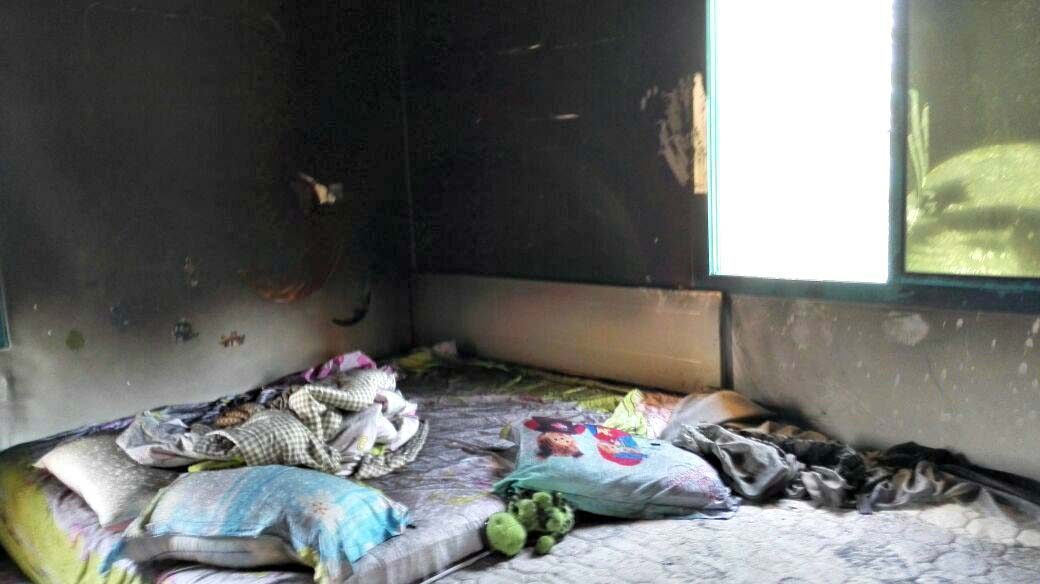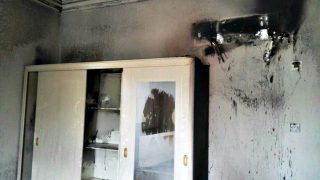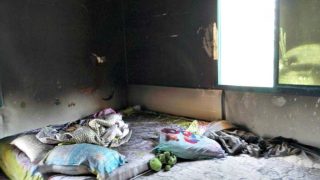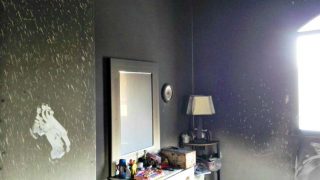Days after escaping a fire in her Al Hilal flat caused by a malfunctioning air conditioning unit, a single mother is sharing her story in hopes that other Qatar residents take steps to keep themselves safe.
Speaking to Doha News, the 33-year-old resident, who asked not to be named, said she and her 20-month-old daughter had only moved into the housing – a partitioned villa – nine days before the fire.
The blaze broke out after she left for work and dropped her daughter off at nursery, she explained:
“I usually put the A/C on in the mornings before I leave for work and turn it off when I come back so that it’s not running 24/7. On Tuesday morning, I turned it on at 7am as usual, but by noon, I got a call saying that there was a fire at the house. A passerby saw flames and alerted my neighbor, who quickly called the fire department.
Thank God we weren’t at home at the time. I had been asking the landlord to switch out the AC since the second day we moved in, but he said no. It was giving us a lot of trouble. It looked old, and sometimes it wouldn’t start.”
When she returned home, she found her flat swarming with police and fire personnel. A wardrobe had been burned, and there was soot everywhere.

But when asked by the police if she wanted to open a case, the woman said she refused out of fear.
“The landlord threatened me and said that I was in trouble because it was my fault for leaving the A/C on. So when the police asked if I want to open the case, I said no. I also had to go down to the police station to file a report if I wanted a case, and I couldn’t do that when my house was like that and I had a baby to take care of,” she said.
The woman said she has attempted to reopen the case, but faces several obstacles.
For example, the landlord has since cleared the burned AC unit from the villa, and in the absence of the evidence, police officials have allegedly encouraged her to let the event slide.

She added that the landlord has stressed that the cost of fixing the AC and repainting the house was the tenant’s responsibility, and that if she had any other complaints or issues, she was free to vacate the premises.
“There’s another AC in the living room that’s very old. After the fire, I asked him to change it, but he refused and said that if I wanted it fixed, I would have to do it myself.
I don’t have the time or money for that. If I want to move out, I lose my deposit, month’s rent and other fees that I’ve paid, and that’s about QR12,500,” she said.
Finally, by living in partitioned housing, the woman could expose herself to legal liabilities by pursuing a police case. Though the practice is common among the expat population, partitioned villas in Doha violate local residential laws and pose numerous safety hazards.
Over the past year, the government has been attempting to crack down on these illegal homes, instituting stricter laws that increase penalties for landlords and stepping up enforcement.
Electrical fires
The resident is now appealing to the Doha community to ensure that their A/Cs are regularly serviced, especially during the summer months, and that landlords are made aware of any problems with the units.
Summer is a common time for electrical fires in Qatar, as more people rely on A/Cs to stay cool.

Last June, residents were horrified to hear the case of six-month-old Elizabeth Soffe, who suffered burns to 60 percent of her body following an A/C fire in her home.
According to Soffe’s family, the unit caught fire moments after the baby’s mother lay her down to rest in a cot placed beneath the A/C.
The mother said she heard the child crying and found her room engulfed in smoke, and the crib on fire.
According to friends of the family, Sinead Soffe grabbed her daughter and did her best to extinguish the flames, before running downstairs with the child and calling an ambulance.
At the time, Sinead encouraged residents to take better precautions.
“For now we would hope that each and every one of you insist your landlords check your electrics and install more smoke alarms. We had one in every bedroom, but it happened too fast – but it could save a life,” she wrote.
Safety tips
In an effort to curb the number of electrical fires during the summer, the Ministry of Interior typically releases a series of home safety tips, including:
- Don’t run your A/C non-stop. Air conditioners in Qatar sometimes catch on fire because the constant swirling dust can settle over electrical components, which could cause an overload and generate excess heat, leading to fire.
- Before going to bed, turn off air conditioners in parts of your home that you are not using. Unplug video game consoles and other non-essential electrical appliances.
- Don’t overload an electrical socket by plugging in too many devices at once, or by plugging in high-voltage devices without the use of good electrical connectors.
- Do not leave exhaust fans running continuously as it raises the temperature of the wires and can contribute to a fire.
- Before going on vacation, turn off all nonessential electrical appliances, close all gas cylinders tightly and store them away from direct sunlight.
- Close gas cylinders properly. Gas fires are considered one of the most dangerous types of fires. A pizza oven whose gas had been left on overnight is said to have caused last year’s restaurant blast that killed 11 people. Make sure your canisters are tightly closed and stored away from sunlight.
Thoughts?










